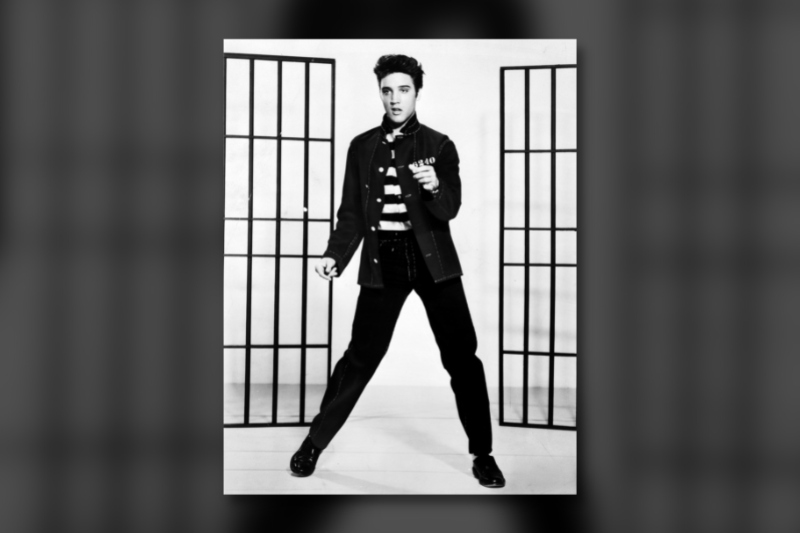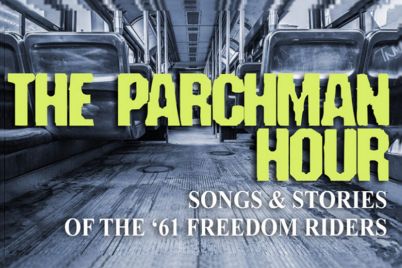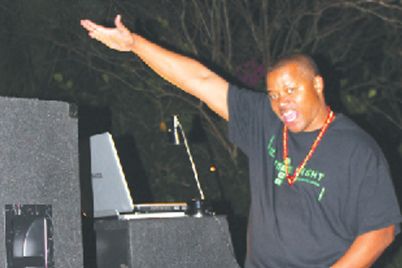From singing groups such as the Blackwood Brothers to the Ink Spots, from hillbilly to country, from Black gospel to white gospel — and especially rhythm and blues – Elvis Presley drew from various influences on his way to becoming not just a superstar performer but an American icon.
BY FRANK DROUZAS, Staff Writer
It is the 45th anniversary of Elvis Presley’s passing, and musical artists of all genres continue to pay well-deserved fealty to the man whose career spanned over two decades and forever altered the musical and cultural landscape of our country.
Original talent that he was, Presley himself made no bones about the debt he owed to his roots. From singing groups like the Blackwood Brothers to the Ink Spots, from hillbilly to country, from Black gospel to white gospel — and especially rhythm and blues — Presley drew from various influences on his way to becoming not just a superstar performer but an American icon.
However, he didn’t do it alone. Here are five songs that helped propel him early in his career, as he ultimately claimed the title of “King of Rock and Roll.”
‘That’s All Right (Mama)’ written by Arthur “Big Boy” Crudup, recorded in 1946
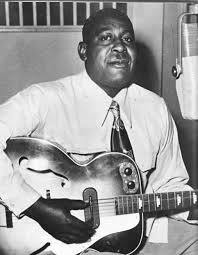
Arthur “Big Boy” Crudup
It took a Delta bluesman to help kick start the rock and roll revolution. Hailing from Forest, Miss., the sharecropping and bootlegging Crudup journeyed to Chicago, where he recorded “That’s All Right (Mama)” above a pawn shop on South State Street. He received a flat fee for making recordings for Lester Melrose’s Bluebird Records but didn’t score a red cent when it came to royalties when the songs became hits. Unsurprisingly, Crudup carried a sizable chip on his shoulder about this for years.
A lively blues number in its original form, it was transformed into something almost otherworldly one summer night in 1954. Presley, guitarist Scotty Moore and bassist Bill Black were taking a break from recording in Sam Philips’s Sun Studio in Memphis when Presley picked up his Martin D-18 guitar and started wildly strumming.
Letting off some steam from what he thought was a lackluster session, he started playing Crudup’s blues song in a wild, exaggerated manner, singing and playing with abandon. Moore and Black joined in, and Phillips, listening from the control room, knew they had something extraordinary. He asked what they were doing and then asked if they could do it again, this time so he could get it down on tape.
They worked on it for several takes, retaining its freshness and unrestrained spirit and cropping a couple of verses along the way. The finished song was fierce and tight, clocking in at under two minutes, and didn’t sound quite like anything recorded before by Black or white musicians.
Released a couple of weeks later as a single and constantly played on Memphis radio stations, “That’s All Right (Mama)” proved to be a shot of vitality the post-war young people were looking for, though they hadn’t known it. With this song — with this sound, really — they knew (or rather, felt) that they finally had something of their own. It was the ignition for Presley’s skyrocket to fame.
Crudup wrote a host of songs covered by other artists, including “My Baby Left Me,” which Presley also recorded at Sun. He was still trying to secure royalties and the rights to his own songs when he died in 1974.
According to Peter Silverton’s book “Essential Elvis,” Presley once told a journalist: “I used to hear Arthur Crudup bang his box the way I do now, and I said that if I ever got to the place where I could feel all that Arthur felt, I’d be a music man like nobody I ever saw.”
‘Good Rockin’ Tonight’ written by Roy Brown, recorded in 1947
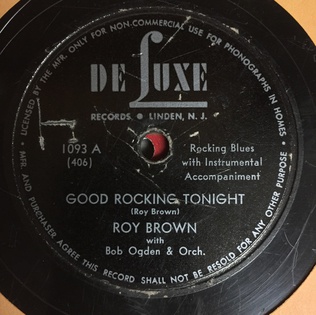
In 2022, Brown’s recording of ‘Good Rockin’ Tonight’ was inducted into the Blues Hall of Fame.
Roy Brown recorded this jump blues song the decade before the rock and roll explosion, and its influence is profound.
Chock full of the sort of sexual braggadocio on which Bo Diddley would later build a career, it includes the modest proclamation: “I’m gonna hold my baby as tight as I can/Tonight she’ll know I’m a mighty, mighty man.” As bluesman Brown goes on to sing about clandestine meetings “behind the barn,” the song’s breezy, swinging arrangement, full of horns, belies its sexual undertone.
Whereas Brown’s version is smoothly and joyously sung, Presley’s lusty delivery is almost sinister, especially when he sings to his baby, “I won’t do you no harm,” leaving zero doubt about what the rendezvous behind the barn is all about.
Coupled with the rhythmic drive of the bass and guitar, it became the second Sun single Presley released in Sept. 1954. Other artists also performed the energetic tune before and after Presley’s take, including blues shouter Wynonie Harris and Bruce Springsteen and the E Street Band. In 2022, Brown’s recording of “Good Rockin’ Tonight” was inducted into the Blues Hall of Fame.
‘Mystery Train’ written by Herman ‘Junior’ Parker, recorded 1953
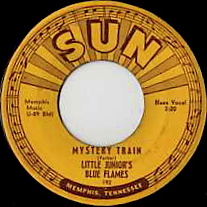
Herman ‘Junior’ Parker’s ‘Mystery Train’ became a rockabilly standard.
Born in Mississippi, Herman “Junior” Parker sang gospel music as a youngster and then played on blues circuits as a teen before working with such renowned bluesmen as Sonny Boy Williamson and Howlin’ Wolf in the 1940s. Forming his own band in the early 1950s, the Blue Flames, Parker and his band signed with Sam Phillips at Sun Studio in 1953. There the Blue Flames released a few successful singles, including “Feelin’ Good,” which climbed to number five on the Billboard R & B chart, and “Mystery Train.”
Accompanied by chugging rhythmic piano and a wailing horn, Parker mournfully sings about a long, black train coming around the bend — 16 coaches long — taking his baby away, and “it’s going to do it again.” After some honeyed guitar licks during the song’s bridge, Parker sings in the last verse, however, that the train is bringing his baby back to him.
In recording what would be his last single at Sun, Presley speeds up the tempo in his version as the rhythm chugs a hair faster and the vocal is more enthusiastic. Throughout, it is a declaration of hope, of a young man’s confidence that he will be reunited with his departed girl — and the train will never take her away again. It became a hit for Presley, and Parker saw it become a rockabilly standard performed by various bands over the years before passing away at 39 in 1971.
‘Lawdy Miss Clawdy’ written by Lloyd Price, recorded in 1952
As his star rose, Presley leaped into the national spotlight by signing to RCA Records in Nov. 1955. In his early days with the label, he covered several R & B hits, including Little Richard’s “Tutti Frutti,” Ray Charles’s “I’ve Got A Woman,” Joe Turner’s “Shake, Rattle and Roll,” and “Lawdy Miss Clawdy” by Lloyd Price.
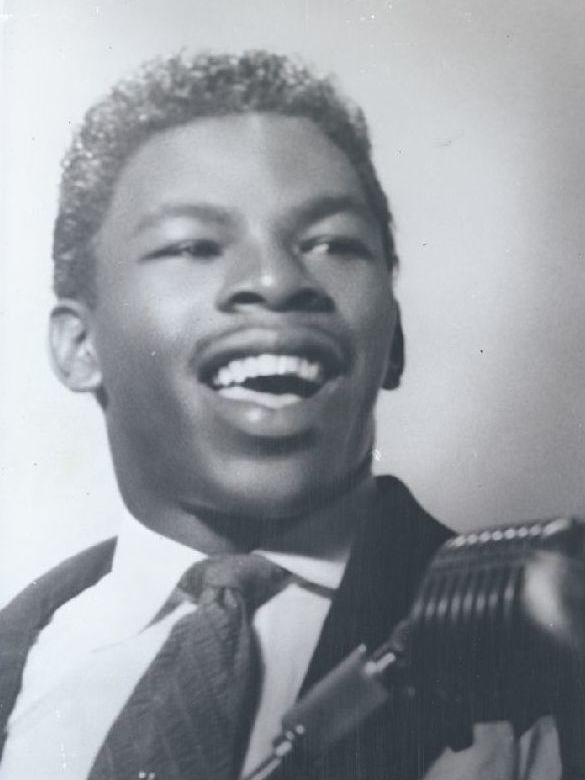
Lloyd Price’s ‘Lawdy Miss Clawdy’ became one of the biggest selling R&B records of 1952 and crossed over to other audiences.
Silverton writes: “A number one R&B hit in 1952, it was recorded in New Orleans by Art Rupe, owner of the Hollywood-based R&B label, Specialty. Rupe went to New Orleans in search of ‘another Fats Domino’ and found a 17-year-old piano-playing airport worker,” which turned out to be Price.
Looking for that New Orleans sound, Rupe heard “Lawdy Miss Clawdy” and instantly wanted to record it. Since Price had no band, Rupe had to provide musicians for the session, which included Fats Domino himself on piano. The bluesy release became a huge hit, occupying the number one spot on the Billboard R & B chart for seven weeks.
Price’s heartfelt singing, complete with the song’s final lyric, “So bye, bye bye, baby/Girl I won’t be coming no more/Goodbye little darling/Down the road I go,” perfectly expresses the anguish of a relationship ending.
Recorded in Feb. 1956, Presley’s take on the song may be bouncier, but his vocal is no less fervent in its angst. He revived the song (along with his career) when he sang it on his television special in 1968, often known as the “comeback” special. Presley continued to perform “Lawdy Miss Clawdy” in concert into the 1970s.
‘Don’t be Cruel’ written by Otis Blackwell in 1956
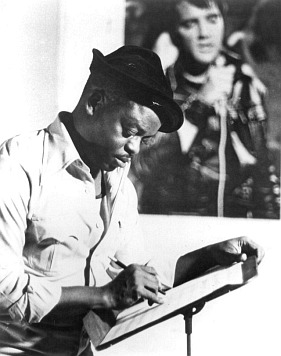
Otis Blackwell was one of the leading Black figures in rock and roll.
Virtually unknown to the public, Otis Blackwell was one of the leading Black figures in rock and roll. A performer himself early in his career, by the mid-1950s, he was primarily a songwriter, and his compositions have been recorded by a host of diverse, grateful artists, including Ray Charles, Otis Redding, Jerry Lee Lewis, Peggy Lee, James Brown, the Who, Dolly Parton and Elvis Presley.
An admirer of Blackwell, Presley knew when he first heard a demo of his song “Don’t Be Cruel” that he wanted to record it. Already having struck gold with his first number one hit at RCA, “Heartbreak Hotel,” Presley soon learned “Don’t Be Cruel” within a matter of minutes and then put it down on tape (though it took about 30 takes to get it just right).
It was released in the summer of 1956 — backed with “Hound Dog” on the flip side — and became the biggest selling single of that year. Easily one of his most recognizable songs, it is a perfect piece of pop music with its ultra-catchy groove and Presley’s imploring inflections. It accomplishes what all singles strive to do: creates a world that exists for only minutes but feels like it should last forever.
Though Presley — who sometimes altered lines in songs to suit him — is listed as a co-writer on the record’s label, it is essentially Blackwell’s work. Likely, Blackwell struck a deal to give up half the royalties to ensure a star like Presley covered it.
Though the writer would never meet the singer in person, Blackwell would go on to write more hits for Presley, among them such gems as “All Shook Up,” “Paralyzed,” “One Broken Heart For Sale” and “Return To Sender.”
Recognized for his accomplishments, Blackwell was named a 2010 recipient of the Ahmet Ertegun Award in the Rock and Roll Hall of Fame, a category that encompasses those who mostly work behind the scenes in the music industry. In 2022 he was inducted into the Blues Hall of Fame.

